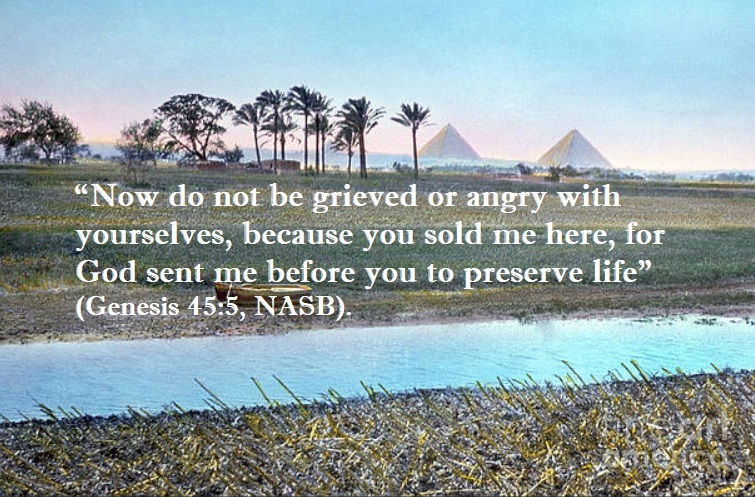“Go therefore and make disciples of all the nations…teaching them to observe all that I commanded you; and lo, I am with you always, even to the end of the age” (Matthew 28:19-20, NASB).
——————–
Contents:
1) “Does God Work Providentially Today?” (Mark Mayberry)
2) Strengthened with Adversity (Wilson Adams)
——————–

-1-
“Does God Work Providentially Today?”
Mark Mayberry
Answering the question, “Does God work providentially today?” requires a proper understanding of the term and a clear understanding of Scripture.
How does one define “providence”? Dictionary.com says “providence” refers to “(1) the foreseeing care and guidance of God or nature over the creatures of the earth; (2) God, especially when conceived as omnisciently directing the universe and the affairs of humankind with wise benevolence; (3) a manifestation of divine care or direction; (4) provident or prudent management of resources; prudence; (5) foresight; provident care.”
The Greek word pronoia, occurring twice in the New Testament, refers to foresight or forethought, i.e., “thoughtful planning to meet a need” [BDAG]. When Paul was tried before Felix, the prosecuting attorney, Tertullus, began his speech by praising the governor: “Since we have through you attained much peace, and since by your providence reforms are being carried out for this nation, we acknowledge this in every way and everywhere, most excellent Felix, with all thankfulness” (Acts 24:2-3). Note its usage in Romans 13:13-14, which reads, “Let us behave properly as in the day, not in carousing and drunkenness, not in sexual promiscuity and sensuality, not in strife and jealousy. But put on the Lord Jesus Christ, and make no provision for the flesh in regard to its lusts.” Stated positively, Felix was praised/flattered for his beneficent oversight of the Jewish people; stated negatively, we must not deliberately purpose to fulfill the lust of the flesh. Men can act with forethought, either for good or ill. In contrast, God’s providential forethought is always for good, in furtherance of truth and right.
Does God work providentially today? Let us answer this question by asking several other related questions:
Does God answer prayer today? Teaching the disciples to pray, Jesus emphasized things important to God (praise, purpose, proper response) and significant needs of men (provision, pardon, and prevailing over temptation) (Matt. 6; Luke 11:1-3). Other objects of prayer are enjoined in Scripture: We should pray for kings and all who are in authority, so that we may lead a tranquil and quiet life in all godliness and dignity (1 Tim. 2:2). We should pray for those who are sick, that they might be restored (James 5:14). We should pray for the spiritual growth and maturity of fellow-Christians (Col. 1:9-10).
Does God still rule in the kingdoms of men? Indeed. The Book of Daniel repeatedly affirms that God reigns in the kingdoms of men, giving power to whomever He chooses, raising up and casting down (Dan. 2:21; 4:17, 26, 32; 5:18- 21). Presenting his sermon on Mars Hill, the inspired apostle said, “He made from one man every nation of mankind to live on all the face of the earth, having determined their appointed times and the boundaries of their habitation, that they would seek God, if perhaps they might grope for Him and find Him, though He is not far from each one of us” (Acts 17:26-27). By urging disciples to pray for kings and all who are in authority, so that we may lead tranquil lives in all godliness and dignity, Paul affirms the continuing validity of this principle (1 Tim. 2:1-2). Has this reality changed? Has God’s power and authority diminished? Of course not.
Does God still have a purpose for mankind? Certainly. Ephesians 3:10 speaks of the eternal purpose which He carried out in Christ Jesus our Lord. We are called according to His own purpose and grace which was granted us in Christ Jesus (2 Tim. 1:9). Will He preserve the church of Christ? When Peter made the good confession, “You are the Christ, the Son of the Living God,” Jesus answered “Upon this rock I will build My church; and the gates of Hades will not overpower it” (Matt. 16:18). Believers have received a kingdom that cannot be shaken (Heb. 12:28).
Does God still provide for His people? Yes. The Psalmist said, “I have been young and now I am old, yet I have not seen the righteous forsaken or his descendants begging bread” (Psa. 37:25). In the Sermon on the Mount, Jesus affirms that God will provide food, clothing, and shelter to those who faithfully serve Him (Matt. 6:24-33). Do faithful disciples today enjoy this same assurance? Of course!
Does God still protect His own? Absolutely. No malicious foe can snatch us from the Father’s hand (John 10:27-30); no malignant power can separate us from the love of Christ (Rom. 8:33-39). No temptation has overtaken us but such as is common to man; and God is faithful, who will not allow us to be tempted beyond what we are able, but with the temptation will provide the way of escape also, so that we will be able to endure it (1 Cor. 10:13). Again, the apostle said, “The Lord is faithful, and He will strengthen and protect you from the evil one” (2 Thess. 3:3).
Does God still remember His promises? Without doubt. Providence is clearly implied in the many “I will…” passages of promise. Consider God’s threefold promise to Abraham of land, nation, and Seed (Gen. 12:1-3, 7). Note His assurance of deliverance from Egyptian captivity (Gen. 15:12- 16). Reflect upon His oaths relating to the restoration of Israel (Isa. 44:26; Jer. 7:19; 16:14-15; 30:1-3; Amos 9:11). Consider His commitment regarding the Messiah/Christ (Deut. 18:18; 2 Sam. 7:12; Jer. 23:5).
Conclusion
God still answers prayer today. He still rules in the kingdoms of men. He still has a purpose for mankind. He still provides for and protects His own. He still remembers His promises. Therefore, we assuredly believe that God works providentially today.
Yet, we must recognize the relationship between divine providence and personal responsibility. God provided a ram to sacrifice in the place of Isaac after Abraham demonstrated willing obedience (Gen. 22:1-14). God provided for the physical needs of Israel when they walked in His statues and kept His judgments (Lev. 26:3-10). God delivered Esther and the Jews as she courageously brought the report of Haman’s plot before King Ahasuerus (Esth. 4:1-16). God will provide us with the physical necessities of life, but we must seek first His kingdom and His righteousness (Matt. 6:24-33). He has blessed us with the spiritual necessities of life, but we must diligently study and apply His word (2 Pet. 1:2-3). He will deliver us from temptation, but we must diligently look for that way of escape (1 Cor. 10:13).
— Via Truth Magazine, Volume 58, Number 3, March 2014
https://www.truthmagazine.com/archives/volume58/2014_03_Mar_Truth_Magazine.pdf
——————–
Esther 4:13-14
“…Do not imagine that you in the king’s palace can escape any more than all the Jews. For if you remain silent at this time, relief and deliverance will arise for the Jews from another place and you and your father’s house will perish. And who knows whether you have not attained royalty for such a time as this?” — NASB
——————–

-2-
Strengthened with Adversity
Wilson Adams
What went wrong with the bio-dome? (that rhymes — almost).
It was the quintessential social experiment of the 80s — near Tucson. Scientists used indoor technology to create the perfect space should humans be unable to make Planet Earth great again. The bio experiment didn’t go that well.
One issue… trees. Outfitted to reflect earth’s diversity (simulating desert to rainforest), the trees inside the biosphere grew quickly. But they kept falling over before they reached maturity. From soil to sun, they had all they needed. However, one condition that could not be recreated in this man-environment? Storms.
Without storms, the trees were unable to develop strong roots. The wood became soft and, although they were fast growing, the lack of wind resistance became their downfall (literally).
Trees grow from sapling to strong because they endure seasons of storms. Hmm. Like us?
A life without storms may give us what we think we need, but it’s really the opposite. Instead of sheltering ourselves, storms test our resolve. The harder the winds, the greater the roots. Thus, resistance is a huge part of our resilience. In other words, storms make us strong. All of which says…
There’s grace in the gale — grace we may not see at the moment. The storms of suffering move us into new stories of life — strong. What seems like chaos may actually be His creation — slow growing our roots while strengthening our resolve… to be more like Him.
— from an untitled post at Wilson Adam’s Facebook site, January 2023
——————-
James 1:2-4
“Consider it all joy, my brethren, when you encounter various trials, knowing that the testing of your faith produces endurance. And let endurance have its perfect result, so that you may be perfect and complete, lacking in nothing.”
NASB
——————-
The Steps That Lead to Eternal Salvation
1) Hear the gospel — for that is how faith comes (Rom. 10:17; John 20:30-31).
2) Believe in the deity of Jesus Christ, the Son of God (John 8:24; John 3:18).
3) Repent of sins. For every accountable person has sinned (Romans 3:23; Romans 3:10), which causes one to be spiritually dead (Ephesians 2:1) and separated from God (Isaiah 59:1-2; Romans 6:23). Therefore, repentance of sin is necessary (Luke 13:5; Acts 17:30). For whether the sin seems great or small, there will still be the same penalty for either (Matt. 12:36-37; 2 Cor. 5:10) — and even for a lie (Rev. 21:8).
4) Confess faith in Christ (Rom. 10:9-10; Acts 8:36-38).
5) Be baptized in water for the remission of sins (Mark 16:16; Acts 2:38; 22:16; 1 Pet. 3:21). This is the final step that puts one into Christ (Gal. 3:26-27). For from that baptism, one is then raised as a new creature (2 Cor. 5:17), having all sins forgiven and beginning a new life as a Christian (Rom. 6:3-4). For the one being baptized does so “through faith in the working of God” (Col. 2:12). In other words, believing that God will keep His word and forgive after one submits to these necessary steps. And now as a Christian, we then need to…
6) Continue in the faith by living for the Lord; for, if not, salvation can be lost (Matt. 24:13; Heb. 10:36-39; Rev. 2:10; 2 Pet. 2:20-22).
——————–
Tebeau Street
CHURCH OF CHRIST
1402 Tebeau Street, Waycross, GA 31501
Sunday: 9 a.m. Bible Classes and 10 a.m. Worship Service. We also have a Congregational Song Service at 5 p.m. for every first Sunday of the month.
Wednesday: 7 p.m. Bible Classes
evangelist/editor: Tom Edwards (912) 281-9917
Tom@ThomasTEdwards.com
https://thomastedwards.com/go/all.htm/ (This is a link to the older version of the Gospel Observer website, but with bulletins going back to March 4, 1990.)